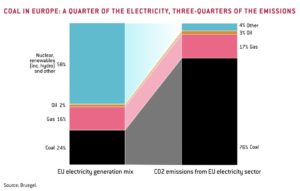Poland Finally Acts European, to Adopt Tougher Climate Change Norms
 Over 100,00 people are employed in the coal mines of Poland
Over 100,00 people are employed in the coal mines of Poland
Poland, one of the largest users and producers of coal in Europe will finally ratify the Doha Amendments, which extends the mandate of the legal framework for reducing greenhouse gas emissions provided by the Kyoto Protocol till 2020. The news is especially an important development as after many delays, Poland has agreed to come under the ambit of the Paris agreement.
“We are ratifying the Doha Amendment in a symbolic way in, together with other countries, at the United Nations in New York on September 27,” Poland’s Deputy Environment Minister Micha Kurtyka, who will serve as the chair of the United Nations Climate Change meeting in Katowice.
Poland currently is the only member-state of the European Union that is yet to formally adopt the Doha Amendments. Under the terms of the amendment, by 2020, Poland must reduce the amount of carbon dioxide it produces by 20 per cent from the 1990 level of production.
The 1997 Kyoto treaty’s mandate came to an end in 2012. Its mandate was extended for another eight years up to 2020 at the Doha round of the UN climate talks in 2012. These amendments are central to reducing greenhouse gas emissions in period ahead of the implementation of the Paris Agreement.
The second mandate period of the Kyoto Protocol will only become operational after 144 countries, that is, three-fourths of the countries that are party to the Kyoto Protocol, ratify the Doha Amendments. Till date only 115 countries have ratified the amendments.
 For long Poland has taken a reluctant stance on the agreeing to a target for reducing carbon dioxide emissions, largely driven by its dependence on coal and the country’s powerful miners’ unions. The country’s addiction to coal has led to an increased dependency on imports from its eastern neighbour just as prices are rising while wind power is getting cheaper. It’s forced Poland’s government to shift its energy policy toward European Union renewable energy targets and away from the polluting coal-fired electricity generation. The European Union energy system has been shifting to become more greener and more efficient, but its most polluting component – coal – continues to provide a quarter of its electricity.
For long Poland has taken a reluctant stance on the agreeing to a target for reducing carbon dioxide emissions, largely driven by its dependence on coal and the country’s powerful miners’ unions. The country’s addiction to coal has led to an increased dependency on imports from its eastern neighbour just as prices are rising while wind power is getting cheaper. It’s forced Poland’s government to shift its energy policy toward European Union renewable energy targets and away from the polluting coal-fired electricity generation. The European Union energy system has been shifting to become more greener and more efficient, but its most polluting component – coal – continues to provide a quarter of its electricity.
Poland has about $30 billion of planned wind projects 30 kilometers (19 miles) out in the Baltic. Even though the country had become the biggest wind power player in the region, generating almost double second-place Romania, Coal represented 78 percent of total power generation, albeit down from 84 percent in 2016.
Poland has also invested heavily in electric vehicles, with Kurtyka leading the effort. Since 2017, a law on electro-mobility and alternative fuels offers multiple rewards to e-car drivers, such as the possibility to drive in bus lanes or escape excise tax. Prime minister Mateusz Morawiecki has set a goal to put one million electric vehicles on Poland’s roads by 2025.
Kurtyka said that Poland “is very much engaged in pre-2020 action” and the idea behind the symbolic ratification in New York is “to give momentum” to the pre-2020 efforts to tackle climate change before the December meeting in Katowice.
But Political statements are a common device in the UN process. They can propose solutions to specific problems, form new commissions or simply commit governments to put new attention on an issue. If the countries can show some direction and intent through action and at the same time schemes like carbon trading can be discouraged, actual development will take form. Poland’s ratification of Doha Amendments will materialise into actual reality.




